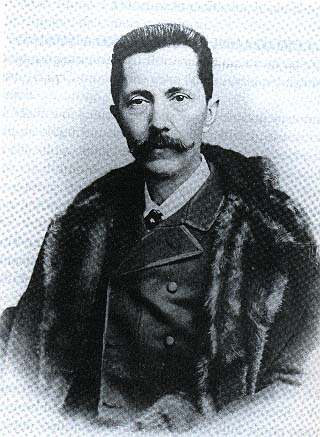Giulio Bizzozero
Giulio Bizzozero (20 March 1846 – 8 April 1901) was an Italian pathologist and biologist who is best remembered for his contributions to the understanding of the role of platelets in blood clotting and the discovery of Helicobacter pylori, a bacterium linked to gastritis and peptic ulcers. His work laid the foundation for modern hematology and gastroenterology.
Early Life and Education[edit | edit source]
Giulio Bizzozero was born in Varese, Lombardy. From a young age, he showed a keen interest in the natural sciences. He pursued his medical studies at the University of Pavia, one of the oldest universities in Europe, where he was influenced by many prominent scientists of the time, including Camillo Golgi, with whom he shared a lifelong friendship and collaboration.
Career and Research[edit | edit source]
After completing his studies, Bizzozero became a professor of general pathology at the University of Turin in 1872. It was here that he conducted much of his groundbreaking research. In 1882, he discovered the role of platelets in blood clotting, identifying them as the third formed element of the blood, alongside red and white blood cells. This discovery was crucial in understanding the mechanisms of hemostasis and thrombosis.
Bizzozero was also among the first to describe the intestinal glands (crypts of Lieberkühn) and their role in the renewal of the intestinal epithelium. His work in this area contributed significantly to the field of histology.
Perhaps his most famous discovery came in 1893 when he identified a spiral bacterium in the stomachs of dogs, which he later found in humans as well. This bacterium, now known as Helicobacter pylori, was shown to be a major cause of gastritis and peptic ulcers, revolutionizing the treatment and diagnosis of these conditions.
Legacy[edit | edit source]
Giulio Bizzozero's contributions to medicine were profound. He is often referred to as the father of modern hematology and a pioneer in the study of gastric diseases. His methods of using animal models to understand human disease laid the groundwork for much of modern biomedical research.
Bizzozero's work was recognized internationally, and he was awarded numerous honors throughout his career. Despite his achievements, he remained dedicated to his research and his students until his death in 1901.
Death[edit | edit source]
Giulio Bizzozero died on 8 April 1901 in Turin, Italy. His legacy continues to influence the fields of hematology and gastroenterology to this day.
See Also[edit | edit source]
References[edit | edit source]
Search WikiMD
Ad.Tired of being Overweight? Try W8MD's physician weight loss program.
Semaglutide (Ozempic / Wegovy and Tirzepatide (Mounjaro / Zepbound) available.
Advertise on WikiMD
|
WikiMD's Wellness Encyclopedia |
| Let Food Be Thy Medicine Medicine Thy Food - Hippocrates |
Translate this page: - East Asian
中文,
日本,
한국어,
South Asian
हिन्दी,
தமிழ்,
తెలుగు,
Urdu,
ಕನ್ನಡ,
Southeast Asian
Indonesian,
Vietnamese,
Thai,
မြန်မာဘာသာ,
বাংলা
European
español,
Deutsch,
français,
Greek,
português do Brasil,
polski,
română,
русский,
Nederlands,
norsk,
svenska,
suomi,
Italian
Middle Eastern & African
عربى,
Turkish,
Persian,
Hebrew,
Afrikaans,
isiZulu,
Kiswahili,
Other
Bulgarian,
Hungarian,
Czech,
Swedish,
മലയാളം,
मराठी,
ਪੰਜਾਬੀ,
ગુજરાતી,
Portuguese,
Ukrainian
Medical Disclaimer: WikiMD is not a substitute for professional medical advice. The information on WikiMD is provided as an information resource only, may be incorrect, outdated or misleading, and is not to be used or relied on for any diagnostic or treatment purposes. Please consult your health care provider before making any healthcare decisions or for guidance about a specific medical condition. WikiMD expressly disclaims responsibility, and shall have no liability, for any damages, loss, injury, or liability whatsoever suffered as a result of your reliance on the information contained in this site. By visiting this site you agree to the foregoing terms and conditions, which may from time to time be changed or supplemented by WikiMD. If you do not agree to the foregoing terms and conditions, you should not enter or use this site. See full disclaimer.
Credits:Most images are courtesy of Wikimedia commons, and templates, categories Wikipedia, licensed under CC BY SA or similar.
Contributors: Prab R. Tumpati, MD

